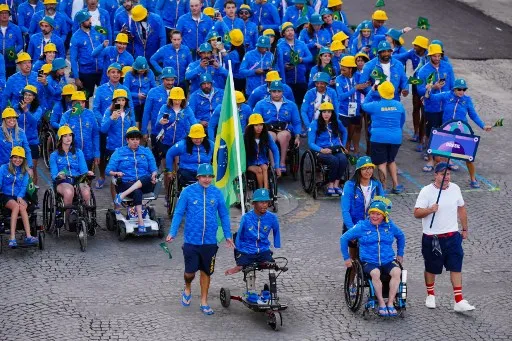The Paris Paralympic Games began this week, and Brazil will compete in 20 of the 22 sports, with a delegation of 255 athletes, the second largest in this edition of the Games – second only to China. As in other editions, the country is expected to win many medals: analysts say Brazil will probably be among the top five in the competition.
The country consolidated its position in the top 10 of the Paralympics in Beijing 2008, when it finished the Games with 47 podiums: 16 gold medals, 14 silver medals and 17 bronze medals, the ninth in that edition’s ranking.
In London 2012, the total number of podiums decreased, but the number of gold medals increased, and the country finished seventh on the medals table (21 gold medals, 14 silver medals and 8 bronze medals). At the Rio Games in 2016, the number of podiums jumped to 72, but a slight drop in the number of gold medals left the country in eighth position. In Tokyo 2020, Brazil returned to seventh position, with the same number of podiums as in Rio, but a record number of gold medals: 22.
According to Rafael Reis, a Paralympic sports researcher, Brazil's success has several causes. He explains that one of the first steps towards the country's prominence in the Paralympics was the creation of the Brazilian Paralympic Committee (CPB, in Portuguese) in 1994.
Thirty years after the CPB was founded, the entity's leading role in the organization and management of Paralympic sports may sound obvious, but before that, each sport had its own organization, as well as individual fundraising.
“That's one of the explanations [for Brazil’s success in Paralympic sports]. When we think about organization and management, when Brazil centralizes actions, coordination and performance, the country starts to achieve better results,” he says.
Reis also explains that there are few academic studies on the quality of CPB's management since it was founded. Empirically, however, he classifies the organization's performance as “efficient”. “The current manager [president Mizael Conrado, a former blind soccer athlete] is good. The previous one [president Andrew Parsons] was good too. It's been a good job, which keeps on,” he says.
He mentions the São Paulo Paralympic Center, a world reference for training in 20 sports, as one of the CPB's best policies.
Financial resources
Another fundamental factor for Brazil's advancement in parasport has been funding: the same mechanisms the country has developed for Olympic sports also apply to Paralympic sports.
The main Brazilian policies are the Agnelo/Piva Law, which allocates funds from lotteries to sport; the Sports Incentive Law, which allows tax waivers from companies and individuals to benefit sports projects; and the Athlete Grant (Bolsa Atleta, in Portuguese), which guarantees income to athletes at different levels of their careers.
The Agnelo/Piva Law, approved in 2001, determines that 2% of the revenues from federal lotteries should be allocated to sport. At the time, 85% of the funds went to the Brazilian Olympic Committee and 15% to the CPB (i.e. 0.3% of total lottery revenues). In 2018, the division was changed, and the CPB now receives 0.87% of all lottery funds, which considerably increases the available budget.
According to a survey by the Sports Intelligence Research Institute of the Federal University of Paraná (IPIE-UFPR, in Portuguese), the Lottery Law has already allocated BRL 1.64 billion (US$291,8 million) to the CPB. In 2023, BRL 223 million (US$39,6 million) was allocated to the organization.
The Athlete Grant funds also stand out. Paralympic athletics is by far the sport that receives the most funds from the program: between 2013 and 2024 it received BRL 146 million (US$25,9 million). This is followed by Olympic athletics, with BRL 90 million (US$16 million) and Paralympic swimming, with BRL 70 million (US$12,4 million).
In 2023, the Athlete Grant earmarked BRL 64 million (US$11,3 million) for paralympic sports. Even before the end of the year, this amount has already been surpassed in 2024: so far it has been BRL 77 million (US$13 million).
Social determinants
In addition to organization and budget, outstanding Paralympic countries generally have another point in common: characteristics of society that influence the number of people with disabilities.
The first of these is population size. This statement is basically statistical: the more people, the greater the chance of sporting talent.
Next, comes social determinants. There are countries where there are more people with disabilities, either because of their participation in conflicts or because of internal characteristics. Brazil, despite not being in an international conflict, has high rates of armed violence. In addition, health and sanitation conditions still favor the development of disabilities, whether congenital or acquired.
“Unfortunately, poverty, lack of basic development and sanitation and violence mean that there are more people with disabilities,” explains Reis.
The National Household Sample Survey – People with Disabilities 2022 shows that 8.9% of the Brazilian population has some kind of disability, which means around 19 million people aged 2 and over.
Grassroots development
For Reis, if there is something to be changed about the measures to boost sports for people with disabilities, it would be to focus on developing sports from the grassroots up, and in a decentralized approach.
“Today, I work with soccer for people with low vision in the state of Paraná. If I leave, maybe this sport will end in the region,” he says. “It can't be like that. There has to be something institutionalized that doesn't depend so much on the will of specific people.”
He believes that the development of parasports, including sports that are not part of the Paralympics, should be done through public policies that go beyond funding.
“Currently, a large part of parasport practices are led by NGOs, which do very important work. However, they are often founded on the goodwill of people affected by disability, but who don't have the resources or training to maintain the project in the long term.”




